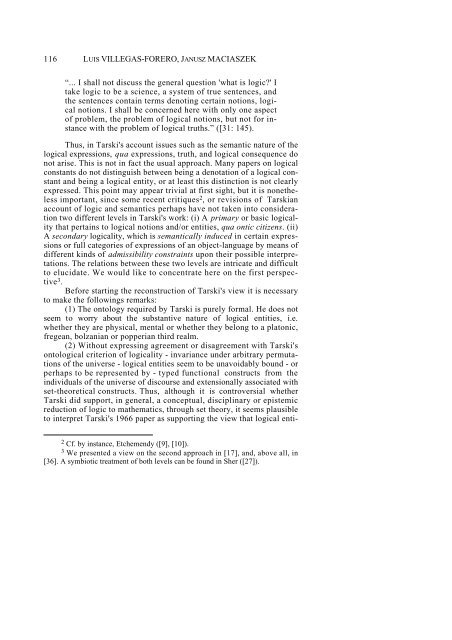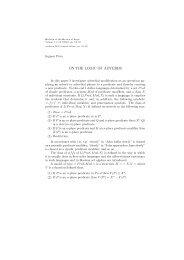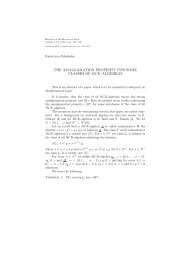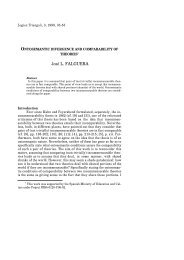Luis VILLEGAS-FORERO, Janusz MACIASZEK
Luis VILLEGAS-FORERO, Janusz MACIASZEK
Luis VILLEGAS-FORERO, Janusz MACIASZEK
You also want an ePaper? Increase the reach of your titles
YUMPU automatically turns print PDFs into web optimized ePapers that Google loves.
116 LUIS <strong>VILLEGAS</strong>-<strong>FORERO</strong>, JANUSZ <strong>MACIASZEK</strong><br />
“... I shall not discuss the general question 'what is logic?' I<br />
take logic to be a science, a system of true sentences, and<br />
the sentences contain terms denoting certain notions, logical<br />
notions. I shall be concerned here with only one aspect<br />
of problem, the problem of logical notions, but not for instance<br />
with the problem of logical truths.” ([31: 145).<br />
Thus, in Tarski's account issues such as the semantic nature of the<br />
logical expressions, qua expressions, truth, and logical consequence do<br />
not arise. This is not in fact the usual approach. Many papers on logical<br />
constants do not distinguish between being a denotation of a logical constant<br />
and being a logical entity, or at least this distinction is not clearly<br />
expressed. This point may appear trivial at first sight, but it is nonetheless<br />
important, since some recent critiques 2 , or revisions of Tarskian<br />
account of logic and semantics perhaps have not taken into consideration<br />
two different levels in Tarski's work: (i) A primary or basic logicality<br />
that pertains to logical notions and/or entities, qua ontic citizens. (ii)<br />
A secondary logicality, which is semantically induced in certain expressions<br />
or full categories of expressions of an object-language by means of<br />
different kinds of admissibility constraints upon their possible interpretations.<br />
The relations between these two levels are intricate and difficult<br />
to elucidate. We would like to concentrate here on the first perspective<br />
3 .<br />
Before starting the reconstruction of Tarski's view it is necessary<br />
to make the followings remarks:<br />
(1) The ontology required by Tarski is purely formal. He does not<br />
seem to worry about the substantive nature of logical entities, i.e.<br />
whether they are physical, mental or whether they belong to a platonic,<br />
fregean, bolzanian or popperian third realm.<br />
(2) Without expressing agreement or disagreement with Tarski's<br />
ontological criterion of logicality - invariance under arbitrary permutations<br />
of the universe - logical entities seem to be unavoidably bound - or<br />
perhaps to be represented by - typed functional constructs from the<br />
individuals of the universe of discourse and extensionally associated with<br />
set-theoretical constructs. Thus, although it is controversial whether<br />
Tarski did support, in general, a conceptual, disciplinary or epistemic<br />
reduction of logic to mathematics, through set theory, it seems plausible<br />
to interpret Tarski's 1966 paper as supporting the view that logical enti-<br />
2 Cf. by instance, Etchemendy ([9], [10]).<br />
3 We presented a view on the second approach in [17], and, above all, in<br />
[36]. A symbiotic treatment of both levels can be found in Sher ([27]).


